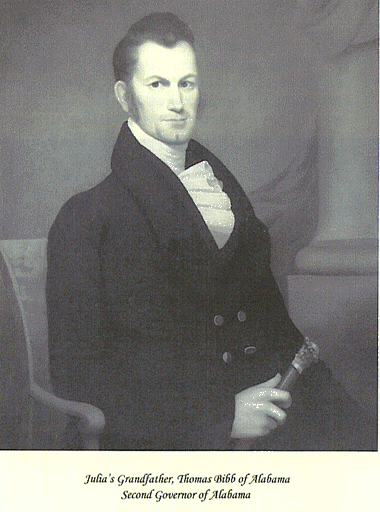
|
 Thomas Bibb 1820-1821 After the death of Governor William Wyatt Bibb on July 10, 1820, the president of the Senate became acting governor as specified by the new state constitution. The president of the Alabama Senate was Thomas Bibb, younger brother of the deceased governor. Like his brother, Thomas Bibb was born in Amelia County, Virginia, but grew up in Elbert County, Georgia. In 1811 he moved to the Tennessee River area of the Mississippi Territory where he became a planter and merchant. He was one of the original settlers in an area that later became known as Limestone County. Bibb represented Limestone County at the 1819 Constitutional Convention, was elected to represent the county in the state Senate, and was unanimously chosen president of the Senate. Thomas Bibb served as Governor from July 1820 to November 1821. It was a relatively quiet period concerned largely with the formation of effective state government, though controversies did erupt over issues of reapportionment and state banking. In addition, feuding continued between opponents and supporters of the "Georgia Faction." During Thomas Bibb's term the state government was formally moved from Huntsville to Cahaba. The General Assembly convened on November 6, 1820 in Cahaba. During the session, which lasted until December 22, 1820, the legislators changed the name of Cahaba County to Bibb County in honor of the deceased governor and passed numerous acts concerned with local municipal government. The legislature also provided for the development of a state bank, though the bank was not established due to insufficient funds. A major issue during the legislative session was the question of reapportionment. The 1819 Constitution required that a census be taken and an apportionment law be passed. Some members of the legislature did not want reapportionment until after the 1821 elections had been held and they succeeded in passing only a law which required a census, which would be the basis of later reapportionment. Governor Bibb called a special session of the legislature to deal with the issue, though they adjourned without a decision. Reapportionment became a major issue in the 1821 governor's race. Bibb did not stand for reelection, but did deliver a strong message to the 1821 Annual Session of the General Assembly before Israel Pickens was confirmed as the new governor. In the message, Bibb urged the Assembly to begin setting up the Bank of the State and recommended selling lands endowed for the state university to finance the bank. Several days later Israel Pickens was confirmed as the winner of the general election and was installed as the new governor. Thomas Bibb was reelected to the Alabama House of Representatives in 1828 and 1829 and served as director of the Huntsville Branch of the Bank of the State of Alabama. He was married to Parmelia Thompson. Collected from the State of Alabama Archives 

|





|